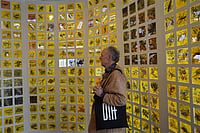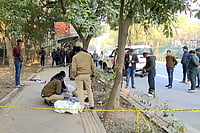Govindas Vishnudas Desani ended life as obscurely as he began it. At 39, when he suddenly appeared on the London literary scene in 1948 with his first and only novel, All About H. Hatterr, no one knew anything about Desani except that he had just published a novel that received rave reviews and was hailed by the likes of T.S. Eliot, E.M. Forster and Edmund Wilson. For the next five decades, his novel did not lack admirers, from Anthony Burgess to Salman Rushdie, who hailed it as "the first great stroke of the decolonising pen". But when Desani died at the age of 91, on November 15, 2000, no one, not even his publishers, noticed that the author of the first Indo-Anglian classic had passed unlamented into the night.
Three weeks later, a small notice appeared in the obit columns of The Hindu declaring that G.V. Desani, Prof Emeritus of Philosophy, University of Texas, and author of All About H. Hatterr (in that order) passed away at Texas, US.
"It is sad that no one noticed the demise of one of India's most original and remarkable writers," says one of Desani's few friends, Khushwant Singh, who was so charmed by Desani's novel that he was even persuaded into proposing his name for the Nobel Prize.
But even Singh, who saw him intimately in the next two decades, learnt nothing of Desani's origins. "He never spoke of his parents and seemed to have no family whatsoever. He died a bachelor," says Singh. Desani was born on July 8, 1909, in Nairobi, Kenya. When he was four years old, Desani's father, a merchant, took his family back to Sindh, where Desani presumably lived until the age of 17, when he went to study in England for two years. But Desani's attitude to family was always as offhand as H. (for Hindustaniwallah) Hatterr's towards his parents: "It was there (India) that my old man kicked the bucket rather in a hurry. The via media? Chronic malaria and pneumonia-plus." Desani does not waste many words on Hatterr's mother either: "I don't know what happened to her. Maybe, she lives. Who cares?"
For Desani, life seems to have begun at 30, when he returned to England in 1939. Working as a bbc broadcaster, he spent the war years writing his first and only masterpiece. Published in 1948, All About H. Hatterr, as Desani readily admits in his frontpage, Warning!, is not really a novel at all. Forced to categorise his rambling, delicious comic quest for truth amidst lying godmen and cheating sadhus, Desani reluctantly itemised his "autobiographical...medico-philosophical grammar...human horseplay...design for diamond-cut-diamond" as a novel.
Literary London was agog. Critics raved. Burgess enthused: "It is the language that makes the book, a sort of creative chaos that grumbles at the banks...philosophical terms, the colloquialisms of Calcutta and London, Shakespearean archaisms, bazaar whinings, quack spiels, references to the Hindu pantheon, the jargon of Indian litigation and shrill babu irritability seethe together."
But Desani was condemned to the fate of any writers' writer: improvident, living off the little he could earn through lecture tours. But he was not a man to doubt his own genius. When he visited India, in the first flush of his literary triumph, and was staying at Singh's home on Janpath, a small literary evening was organised to meet the famous author. "There are only two great novelists," Desani told his audience in Singh's living room. "One is James Joyce and the other is your humble servant."
It was this conviction that fired him to pursue the Nobel Prize. He landed one day at Singh's office in the Indian High Commission in London, armed with a sheaf of papers. It was the paperwork for forwarding his name to the Nobel committee. Having discovered that the committee only considers the names forwarded by either Nobel laureates or a government, Desani zeroed in on the only 'government' he knew. Singh was at that time working in the high commission and was easily persuaded to propose Desani's candidature. "It is quality that matters, not quantity," Desani told Singh loftily, when he feebly pointed out that Desani was the author of only one novel.
Eventually, lack of funds forced Desani to move back to India. He was already interested in the occult and religion, dragging Singh off during their London days to mass hypnosis sessions and the like. But the next 14 years were spent largely as a recluse in India, practicing his Mantrayoga and writing a column for Singh when he became editor of The Illustrated Weekly.
But as far as books went, Desani had lapsed into a silence that lasted almost as long as his life. He used the quality-quantity argument whenever chided about not writing, post-Hatterr. When pressed harder, he claimed that he had in fact completed a manuscript which was stolen. "It's been a severe setback," he explained to the sceptical Singh.
It's almost as if he was overcome by his first spurt of brilliance and was afraid of not matching up. Two years after All About Hatterr, Desani published a slim volume, Hali—A Play. It was, as T.S. Eliot pointed out rather apologetically in the foreword, "not likely to appeal quickly to the taste of many readers". He was not far wrong, and Hali vanished for the next 38 years until it reappeared as Hali and Collected Stories. The flair for comedy is still evident in the 23 short stories, so is the spoofing on colonialism and convention, but somehow the zest and inventiveness of Hatterr, which never ceases to amaze his select circle of admirers, is gone. It's almost like the story that Desani invented at the beginning of Hatterr, about "an oriental gent who spent the better half of his life digging up a pyramid" only to find under it a family of mice. That disillusioned philosopher turned in disgust to writing. It was the other way round for Desani: he stopped writing and escaped into philosophy.
An Oriental Gent
'There are only two great novelists,' he once said. 'One's Joyce, the other, your humble servant.'

An Oriental Gent
An Oriental Gent
Published At:
- Previous Story
 Cinema And The Emergency: What A New Book Reveals About Censorship, Propaganda and Resistance
Cinema And The Emergency: What A New Book Reveals About Censorship, Propaganda and Resistance - Next Story
MOST POPULAR
WATCH
MORE FROM THE AUTHOR
×


















